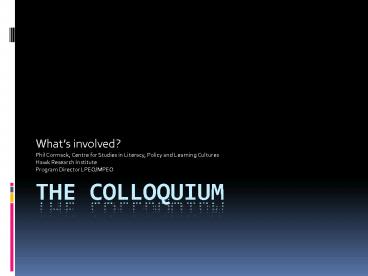The colloquium - PowerPoint PPT Presentation
1 / 12
Title:
The colloquium
Description:
to make a judgement about whether a provisional research degree student is ... becomes a judgement about the candidate. it becomes a judgement about the ... – PowerPoint PPT presentation
Number of Views:2185
Avg rating:3.0/5.0
Title: The colloquium
1
The colloquium
- Whats involved?
- Phil Cormack, Centre for Studies in Literacy,
Policy and Learning Cultures - Hawk Research Institute
- Program Director LPEO/MPEO
2
The purpose
- to make a judgement about whether a provisional
research degree student is sufficiently prepared
to move into the research phase of their
candidacy - to provide support and advice to students before
they embark on their research project.
3
- Specifically, the colloquium aims to ensure that
the proposed research is - well grounded theoretically
- methodologically sound
- ethical
- significant
- achievable
- This responsibility is mandated by the University
through the Research Degree Committee and the
Pro-Vice Chancellor Research
4
The colloquium panel
- The panel is convened and chaired by the Research
Degree Coordinator/Program Director and is made
up of - the principal and associate supervisors, or the
co-supervisors - one or two academic members with expertise in the
research area - for the EdD, an industry representative
- Where the RDC is also the supervisor, an
alternative Chair is appointed
5
How the colloquium is run in the Eastern Canada
program
- Usually, the colloquium is run via teleconference
with participants from different sites connected
to UniSA. We usually arrange for the colloquium
to be recorded so that the student can revisit
the discussion
6
The colloquium process (1)
- The panel meet briefly (30 minutes) to discuss
the proposal and a provisional recommendation - The student then joins the panel (at this point
the recording begins), and they are told the
panels provisional recommendation - The student is invited to provide a five minute
introduction to the proposal and point to any
issues about which they specifically want advice
or comment - The panel members then discuss the proposal with
the student in a roundtable format. Members may
suggest changes to strengthen the candidates
proposal and address problems with the research
process. Any suggested changes should be
consistent with the candidates research focus
and intentions.
7
The colloquium process (2)
- The colloquium concludes with the chair
summarising key points arising from this
discussion including any agreed changes to the
candidates proposal. If the decision of the
panel is that the research should not yet go
ahead, a time for resubmission of the proposal is
agreed. - Following the conclusion of the discussion with
the student, the panel then formally agrees on
recommending one of the following actions - the research should proceed with no amendments to
the proposal - the research should proceed but with amendments
to the research plan that will take into account
suggestions of the colloquium panel and which
should be confirmed with the supervisors in an
agreed time - the proposal should be redrafted and resubmitted
in an agreed time taking into account feedback
provided by the panel - the proposal is rejected and a substantially new
proposal should be developed in an agreed time
before resubmission - (As part of this process the panel may provide
advice to the Principal Supervisor about any
issues that may need to be addressed with the
candidate) - The RDC then writes a letter to the student
summarising the discussion, any recommendations
and the decisions made. This is copied to the
supervisors.
8
The colloquium pitfalls
- looking for perfect understanding of the field,
methodology etc. - it becomes a judgement about the candidate
- it becomes a judgement about the supervisor(s)
9
When the colloquium works (1)
- the candidate has a strong sense of the value of
their research to the field - the candidate has explicit guidelines about
whats needed to get started with the data
generation phase and beyond (including milestones
if necessary) - the candidate has an understanding about whats
involved in research that will make a
contribution to knowledge (and professional
practice)
10
When the colloquium works (2)
- the candidate has been given clear and positive
feedback and advice (often beyond what a
supervisor can provide) - the supervisor has a working plan of issues to
work through with the student - the supervisor has access to a second eye on the
project and experienced support for working with
this student
11
Preparing for the colloquium(1)
- ensure the student is clear about the purpose of
the colloquium i.e. to demonstrate that the
student is ready to start the research data
generation - Has written a concise proposal which
demonstrates/includes - sufficient knowledge of the field (to know what
they will need to know) - a clear goal and associated research questions
- a research design which lines up the goals,
questions and expected outcomes - an understanding of the significance of the
research to the field - a realistic and achievable plan
12
Preparing for the colloquium(2)
- Try to make sure that the panel
- includes academics with knowledge of the
students field and of the methodology proposed - receives the proposal in good time
- knows about your views of the strengths of, and
concerns about, the proposal - knows what help you want the student to receive
from the process































